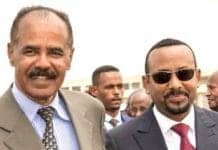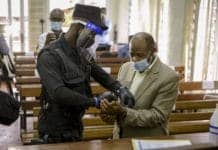by Ann Garrison
KPFA News broadcast June 20, 2015
Dr. Charles Kambanda’s essay, which was first posted to the Facebook forum Friends of Reason (and is posted below – ed.), brought reason to the discussion of presidential term limits in Burundi, which had been overwhelmed by propaganda and fearmongering about the renewal of ethnic violence between Hutus and Tutsis in the tiny East African nation.
Transcript
KPFA Weekend News Anchor David Rosenberg: The international discussion of whether or not Burundian President Pierre Nkurunziza has the legal right to run for another term in office took a rational turn in recent weeks, thanks to Rwandan American lawyer and former National University of Rwanda professor Dr. Charles Kambanda. Kambanda first posted his essay to a Facebook forum Friends of Reason, which is devoted to discussion of war and peace in the Great Lakes Region of Africa. KPFA’s Ann Garrison, who studies and participates in the Friends of Reason Facebook forum, spoke to Dr. Kambanda.

KPFA/Ann Garrison: Dr. Kambanda, could you explain how you brought the voice of reason to the debate about the Burundian Constitutional and political crisis in the Facebook forum Friends of Reason?
Kambanda: The reason why I wrote that piece was to bring the academic aspect into this debate. The debate had basically taken a propaganda trend. My intention was to bring reason into the debate by demonstrating the legal aspects of the problem, and also demonstrating that beyond what people call the Constitutional crisis, there are other complex political and social problems.
KPFA: And it’s your position that the Burundian Constitution gives President Pierre Nkurunziza the right to run again for another term, and that this has been confirmed by the Burundian Constitutional court, right?
Kambanda: Yes. The law of the land, the supreme law of the land, is the Constitution, and Article 96 is clear that a person serves two terms (and) cannot serve beyond two terms if he was elected by universal suffrage. Now, Nkurunziza has served only one term, meaning that, under Article 96, he has the right to run for president and, if elected by the people, then he becomes the president. He has the right; that’s the Constitution.
KPFA: We don’t have time to go deeply into your analysis, but can you summarize why the Arusha Accord on Peace and Reconciliation in Burundi has been improperly invoked as though it were ruling law in this situation?

KPFA: OK, now could you tell us about the Facebook forum “Friends of Reason”? It’s noteworthy as a media story that you have a lot of status in this forum, which includes a number of people who were your students at various East African universities, and your argument obviously had impact almost immediately after you posted it.
Kambanda: Friends of Reason has very many prominent international policymakers. We have people from almost all the donor countries, or Western countries. We have some people there from China, Russia, Britain, France, USA, Germany. We have so many people in this group. Most of them don’t write, but they read what we write there.
So it’s like Friends of Reason brings primary data to the community and then policymakers process that and then make a decision. I find that is the role of Friends of Reason.
KPFA: OK, Charles Kambanda, thank you for speaking to KPFA.
Kambanda: Thank you, Ann.
KPFA: A transcript of this KPFA News report will be published shortly on the website of the San Francisco Bay View, sfbayview.com, along with Dr. Kambanda’s essay and the audio archive of his interview on CIUT-Toronto’s Taylor Report.
Oakland writer Ann Garrison writes for the San Francisco Bay View, Black Agenda Report, Black Star News, Counterpunch and her own website, Ann Garrison, and produces for AfrobeatRadio on WBAI-NYC, KPFA Evening News, KPFA Flashpoints and for her own YouTube Channel, AnnieGetYourGang. She can be reached at anniegarrison@gmail.com. In March 2014 she was awarded the Victoire Ingabire Umuhoza Democracy and Peace Prize for promoting peace in the Great Lakes Region of Africa through her reporting.
CIUT-Toronto’s Taylor Report interview with Dr. Charles Kambanda
On Burundi’s current turmoil: A Constitutional crisis or a set of complex political and economic issues?
by Charles Kambanda
Burundi’s current deadlock, on its face, hinges on the president’s stanch determination to run for another presidential term after 10 years in office. Supporters of the president’s new bid for the top job are convinced that the Republic of Burundi 2005 Constitution does not bar the president from running for another term. On the other hand, opposition leaders argue that the spirit and letter of the Arusha agreement – read together with what opposition leaders call vague presidential terms limit in the Constitution – bars the president from running for another term.
Article 96 of the Republic of Burundi 2005 Constitution provides that “the president of the republic is elected by universal suffrage for a mandate of five years renewable one time.” The president has held office for 10 years now.
Burundi’s opposition leaders and political activists insist that the president is ineligible for another term. The president and his supporters contend that the president has been in office for 10 years. However, the first term he served (five years) was under Title XV “special transitional period” the 2005 Constitution created. Therefore, the president argues, the first five years he served under Title XV do not count for purpose of Article 96.
Burundi’s Arusha agreement adopted five protocols. The pertinent protocol, for purposes of presidential term limits, is democracy and good governance (Protocol 11). Article 7(1)(a) “the [subsequent] Constitution shall provide that, save for the first election of a president, the president … shall be elected by direct universal suffrage …”
Article 7(1)(c) prescribed that the National Assembly would elect the first post transition president through the Article 20(10) procedure. Article 7(3) prescribes that the Constitution of Burundi shall provide that the president is elected for a term of five years renewable only once.
The framers for Article 96 of Burundi’s 2005 Constitution adopted Articles 7(1)(a) and 7(3) of the Arusha agreement without adopting Article 7(1)(c). However, Article 302 of Burundi’s 2005 Constitution provides: “Exceptionally, the first President of the Republic of the post-transition period is elected by the [elected] National Assembly and the elected Senate meeting in Congress; with a majority of two-thirds of the members … The president elected for the first post-transition period may not dissolve the Parliament.”
The face-off centers around various questions: What’s the legal status, if any, of the Arusha agreement in Burundi’s legal regime after the transitional period? Was the Arusha agreement an ordinary contract (guided by its terms and/or common law principles) or was it a treaty (part of Burundi’s law)?
Alternatively, was the Arusha agreement a precursor or an integral part of Burundi’s 2005 Constitution? Is Article 302 an exception to, or does it complement Article 96? Is what’s called a “constitutional crisis” real or imaginary?
Burundi Constitutional Court’s take
The Constitutional Court of Burundi ruled that Burundi’s Constitution does not bar the current president from standing for another term, which would be his last term. In their ruling, the head Justice of the Constitutional Court reasoned that “to understand the spirit of the Constitution, it is useful to first understand the document which most inspired the drafters of the 2005 Constitution.”
Burundi’s Constitutional Court Justices argued that the Arusha agreement is a genuine, unavoidable, inspiring and indispensable document. In effect, the Constitutional Court argued, the Arusha agreement is Burundi’s 2005 Constitution bedrock.
The Justices of the Constitutional court did not present details of their legal reasoning. However, the Justices’ conclusion about the current status and role of the Arusha agreement is revealing.
The Arusha agreement was meant for a specific purpose: establishing principles and rules that would help Burundians to bring an end to their protracted ethnic civil war and build institutions for sustainable peace, security and development. It appears the Justices were convinced that although the Arusha agreement inspired the framers of the Constitution, like any other landmark event in Burundi’s history, the black and white letter of Burundi’s Constitution prevails.
The justices appear to agree that Title XV of the 2005 Burundi Constitution created a special transitional presidency which the framers of the Constitution clearly did not intend to count for purposes of the Article 96 term limit. I would concur.
The Arusha agreement was an ordinary agreement, as opposed to a treaty
The Arusha agreement was a multilateral agreement. There was an offer, acceptance, consideration and there were no defenses for any party against the Arusha agreement. There were specific things each party had to perform within a specific time frame.
To this effect, Protocol V, Article 3(1) created the Implementation Monitoring Committee to: “(a) Follow up, monitor, supervise, coordinate and ensure the effective implementation of all the provisions of the agreement; (b) Ensure that the implementation timetable is respected; (c) ensure the accurate interpretation of the agreement; (d) Reconcile points of view … (f) Give guidance to and coordinate the activities of all commissions and subcommissions set up … for the purpose of implementing the agreement, (g) Assist and support the transitional government in its diplomatic mobilization of financial, material, technical and human resources required for the implementation of the Agreement …”
On the 8th and 9th of August 2005, the Implementation Monitoring Committee held its last meeting, in which they confirmed that the Agreement had been fully implemented. The U.N. Secretary General, having been duly briefed that the Arusha agreement had been successfully implemented and the country was ready for a new and independent legal and political regime, dissolved the committee.
In his report S/2005/586, Sept. 14, 2005, the UN Secretary General informed the United Nations Security Council that the Arusha Agreement had been implemented in toto. Therefore, the Arusha agreement, like any other ordinary contract, terminated naturally by its “termination clause.”
An agreement that has terminated by its own terms and the parties are discharged after complete performance of their bargains would not be reasonably “revived” without a new offer, acceptance, consideration and absence of defenses. It’s my submission that it’s erroneous to evoke the terms of the Arusha agreement after its natural termination.
The spirit of the agreement might be morally binding for ages. However, while we can enforce the law, there is no paradigm to enforce morality.
The Constitutional Court Justices rightly observed that the Arusha agreement remains a living inspiration for Burundians – of all ages – because it was the cornerstone for ending the bloody protracted ethnic war. Jurists from all schools of thought – historical, philosophical and analytical – agree that specific events, life experience or realities inspire each statute or law.
However, the events, life experience or realities that inspire a given statute do not, by themselves, become law. It’s a settled principle that whatever inspired a given statute or law can be helpful for courts to interpret that statute if a term or provision of the statute is ambiguous. However, as the Justices of the Constitutional Court properly reasoned, aside from the fact that the Arusha agreement is a living inspiration for Burundian lawmakers, politicians and civil society, the Arusha agreement was not law and the agreement is not part of the 2005 Constitution.
Burundi’s 2005 Constitution ushered in a new, independent and sustainable legal and/or political regime. That is why Burundi’s 2005 Constitution preamble ends with a conspicuously captioned statement: The Constitution is the fundamental law of the Republic of Burundi.
The 2005 Burundi Constitution did not adopt the Arusha agreement in its entirety or any provision of it
Burundi’s 2005 Constitution mentions the Arusha agreement in its preamble: “Reaffirming our faith in the ideal of peace, of reconciliation and national unity in accordance with the Agreement of Arusha …” This provision in Burundi’s Constitution is instructive.
First, the framers of Burundi’s 2005 Constitution are categorical; the agreement is a set of ideals of a moral nature, not law. Second, it was not the framers’ intention to adopt the Arusha “ideals” by mentioning the agreement in the preamble. It’s a legal principle of general application that mentioning a document or an event in a statute or Constitution, by itself, is insufficient to prove that the document or event is a component of the statute or Constitution.
Article 19 of Burundi’s 2005 Constitution enumerates specific treaties that are an integral part of the Constitution. The Arusha agreement was not a treaty. Therefore, Burundi’s 2005 Constitution does not enumerate the Arusha agreement among the treaties that are an integral part of the Constitution.
Articles 96 and 302 of Burundi’s 2005 Constitution are not inconsistent provisions
Burundi’s 2005 Constitution creates a unique period called the “first post-transitional” under Title XV of the Constitution. The Title XV wording is clear; it reads: “Title XV: Of the particular provisions for the first post-transitional period.”
Title XV set particular procedures for the election of the president in this unique period. Title XV took away some vital powers of the president during the first post-transitional government. Article 96 is clearly not under the Title XV arrangement.
Article 302 is under Title XV; it provides: “Exceptionally, the first President of the Republic of the post-transition period is elected by the [elected] National Assembly and the elected Senate meeting in Congress … The president elected for the first post-transition period may not dissolve the Parliament.” By its letter and spirit, Title XV created a special category of presidency which was, clearly, not intended to count for purposes of Article 96.
The term “exceptionally,” which opens Article 302, does not create an exception to Article 96. The term “exceptionally” under Article 302, as the wording of Title XV suggests, refers to the exceptional epoch (the first post-transition period) and an exceptional procedure for the election of the president Title XV created.
The wording of Title XV of Burundi’s 2005 Constitution is clearly meant to create a distinct and separate transitional period called “the first post-transitional period,” which is outside the scope of the Article 96 presidential term limit.
Save for the clear wording of Title XV, particularly Article 302, the framers of Burundi’s 2005 Constitution could not have used Article 302 to “amend” and/or negate Article 96 of the same Constitution. Therefore, Articles 96 and 302 (presidential term limit, election procedures and powers) were designed for different Constitutional epochs.
In effect, Title XV provisions became obsolete as soon as the first post-transitional period ended. Seeking to apply Title XV provisions today would be applying a dead law. Consequently, understanding the meaning of Articles 96 and 302 is not a Constitutional interpretation issue; it is about reading the black and white letter of the 2005 Constitution
The Burundian ‘deadlock’ is probably broader than the imaginary Constitutional issues
The Arusha agreement was for political transition purposes – from the civil war to sustainable peace. The Arusha agreement was not an eternally enforceable contract among the parties. Many countries that emerged from protracted civil wars had similar agreements.
The standard practice is that transitional agreements do not survive the transitional period save for those principles that implicitly become an integral part of the Constitution. Why do some sections of the public – local and international – expect Burundi to return to a transitional agreement that terminated, yet the 2005 Constitution ushered in a new and independent legal order?
Why is Burundi expected to revive a terminated agreement without new negotiations, contrary to the known contract law principles? Why should a written law, Burundi’s Constitution, be modified and/or invalidated by the spirit or letter of a document which, itself, is not a law?
Why are countries like Rwanda, whose post-conflict Constitution defers from its Arusha Agreement, not compelled to respect their transitional agreement?
Burundi is confronted with deeper political and economic problems, domestically and internationally. Domestically, the ruling power (party?) is excessively strong in terms of resources and membership, in comparison with all the opposition parties put together.
In the most fair and free elections, the possibility that Burundi’s opposition parties will win an election is minimal. Burundi’s opposition political parties are confronted with a political monster in Burundi’s ruling political party.
Political tension in such environment is inevitable. The country’s economic base is too narrow, yet Burundi’s fertility rate is all the way through the roof for a tiny country with an impoverished population.
This opens a floodgate of all social evils and problems, which makes Burundi an active volcano that could erupt any time for any reason – real or imaginary. Internationally, Burundi is a favorable gateway into the Democratic Republic of Congo’s vast and valuable natural resources.
The booming illegal business in DRC has attracted first class multinational companies into that region. Each of these multinational companies wants to influence politics and politicians in Burundi for “favors.”
Burundi has 6 percent of the world’s unexploited nickel deposits. A firm that is affiliated with Russia recently “won” the tender to mine nickel in Burundi. With the cold war reactivated, Burundi is probably a new cold war battleground.
Burundi is up for grab in the balance of power system. It is my submission that the so-called constitutional crisis in Burundi is probably an iceberg of a combination of problems Burundians ought to consider addressing from the roots.
Conclusion
The Arusha agreement was fully implemented. The parties were discharged as per the letter and spirit of Protocol V of the agreement. The Arusha agreement was not an indefinite agreement between parties; it was a transitional agreement among the parties to bring an end to a bloody, protracted ethnic civil war.
The agreement’s moral authority notwithstanding, tying down the sovereign – Burundi – to an agreement that terminated by its own terms is a historical and legal fallacy. The Burundian government is not reasonably expected to enforce moral dictates, which is the proper status of the Arusha agreement in Burundians’ public life.
Burundi’s 2005 Constitution created two distinct and separate epochs: the first post-transitional period (guided by Article XV provisions, including Article 302) and the period thereafter. Seeking to apply Title XV outside its intended epoch is offensive to Burundi’s 2005 Constitution.
The Title XV epoch expired upon the natural end of the first post-transitional government. Therefore, Title XV limits and procedures are irrelevant outside the Title XV epoch.
The alleged “constitutional crisis” is imaginary because Burundi’s 2005 Constitution is not ambiguous. The core issues are political, economic and social, domestically and internationally.
To the extent Burundians address the real problems underlying this imaginary constitutional crisis realistically, Burundians will enjoy sustainable peace.
Charles Kambanda is an attorney and counsel at law in New York.

 Store
Store












